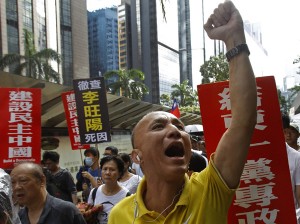
A protester shouts slogans during a protest on June 30, 2012, marking the15th anniversary of Hong Kong’s handover to China. Huge crowds will again march through Hong Kong on Monday, July 1, 2013, to protest against the city’s pro-Beijing leader and the pace of political reforms, as the former British colony marks the 16th anniversary of its handover to China. AP FILE PHOTO
HONG KONG—Huge crowds will march through Hong Kong Monday to protest against the city’s pro-Beijing leader and the pace of political reforms, as the former British colony marks the 16th anniversary of its handover to China.
Organizers said they expect to see more than 400,000 people take part in the annual rally for democracy, which comes amid concerns in the southern Chinese city that Beijing is increasingly meddling in local affairs.
The demand for universal suffrage, a widening income gap and soaring property prices are expected to drive the march as protesters focus their anger on unpopular Chief Executive Leung Chun-ying.
“The main goal of the rally is to push through for genuine democracy and to ask for Leung Chun-ying to step down,” Jackie Hung of the Civil Human Rights Front, which is organizing the march, told AFP.
Government officials refused to speculate on protest numbers expected for the march, which goes from the city’s landmark Victoria Park to its glittering financial district of Central, and strived to play down mounting public anger.
‘We will humbly listen’
“No matter how many people come out, we will humbly listen to their views,” development minister Paul Chan Mo-po said on Sunday.
The protest comes as a survey published by the Hong Kong University Friday found only 33 percent of Hong Kongers took pride in being a Chinese national, the lowest level since 1998.
Leung was appointed by a pro-Beijing committee last July, promising to improve governance and uphold the rule of law in the territory of seven million people.
He is also charged with overseeing the transition to universal suffrage, which the city was promised by 2017, though critics say little or no progress has been made on the issue as the deadline draws nearer.
“This year, the cry for Leung Chun-ying to step down will be very loud because he doesn’t seem to have achieved much in one year,” Democratic Party lawmaker Emily Lau told AFP.
Residents are also unhappy over property prices, which have surged over the past few years due to record low interest rates and a flood of wealthy people from mainland China snapping up homes.
Report card of ‘accomplishments’
In an effort to address his declining approval rating, which fell to 46.2 percent according to a poll conducted by the Hong Kong University released last week, Leung published a report card boasting of his accomplishments.
These included placing a limit on the amount of baby milk formula that can be exported to the mainland after residents complained of severe shortages, and stopping an influx of pregnant mainland mothers from giving birth in the territory.
The measures were seen as an attempt to address soaring tensions between Hong Kongers and their mainland visitors.
The annual July 1 marches marking Hong Kong’s handover became a major fixture in 2003, when 500,000 people showed their fury over a security bill and economic downturn, a key factor in the then chief executive Tung Chee-hwa stepping down the following year.
Last year organizers said 400,000 took to the streets in a defiant reception for Leung hours after he was sworn in as chief executive in front of then Chinese president Hu Jintao, whose visit took place amid smothering security.
Some protesters at previous rallies have blocked traffic and refused to leave the streets in another sign of growing discontent in a city where people normally adhere to law and order.